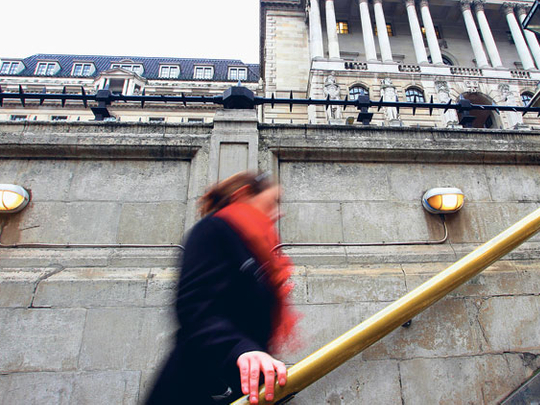
London: Britain registered its biggest annual budget deficit since the Second World War as the election dispute over the government finances intensified.
The £152.8 billion (Dh864 billion) shortfall in the fiscal year through March was 76 per cent higher than a year earlier, the Office for National Statistics said yesterdayn. In March, the deficit was £23.5 billion, the biggest monthly gap since records began in 1993. The figure was in line with median forecast in a Bloomberg News survey.
With the election two weeks away, parties are sparring over how to tackle the largest deficit in the Group of Seven. The Conservative opposition yesterday raised the spectre of an International Monetary Fund bailout if the vote produces a indecisive result.
"It's a reminder that the key economic issue facing the electorate is the deficit," said David Tinsley, an economist at National Australia Bank in London and a former Bank of England official.
The pound was up 0.2 per cent from late on Wednesday at $1.5438 as of 9.54am yesterday in London.
Brown, who faced his opposition challengers last night in the second of three live televised debates, is seeking an unprecedented fourth term for his Labour Party by arguing that Conservative Party plans to cut spending this year risk wrecking the recovery.
Polls show both losing support to a resurgent Liberal Democrat party, raising the prospect that Labour will emerge as the largest party in Parliament and remain in power with Liberal Democrat support.
Conservative economics spokesman George Osborne yesterday warned that Britain could be forced to appeal to the IMF for help if voters choose a parliament where no party has overall control.
"If markets feel we don't have the confidence to deal with our debts, then we'd have to call the IMF in, and that is a statement of fact," Osborne said during a BBC television debate. "We've got to be aware in this country of the consequences of political instability."
Central government receipts fell 5.3 per cent and spending rose 6.8 per cent in the year through March, yesterday's figures showed. The figures include financial sector interventions and the Treasury had forecast a deficit of £156 billion for the fiscal year.
Excluding interventions, the deficit in the last fiscal year was £163.4 billion compared with a Treasury forecast of £166.5 billion.
The UK deficit ballooned as the worst financial crisis since the Great Depression plunged Britain into an 18-month recession.











